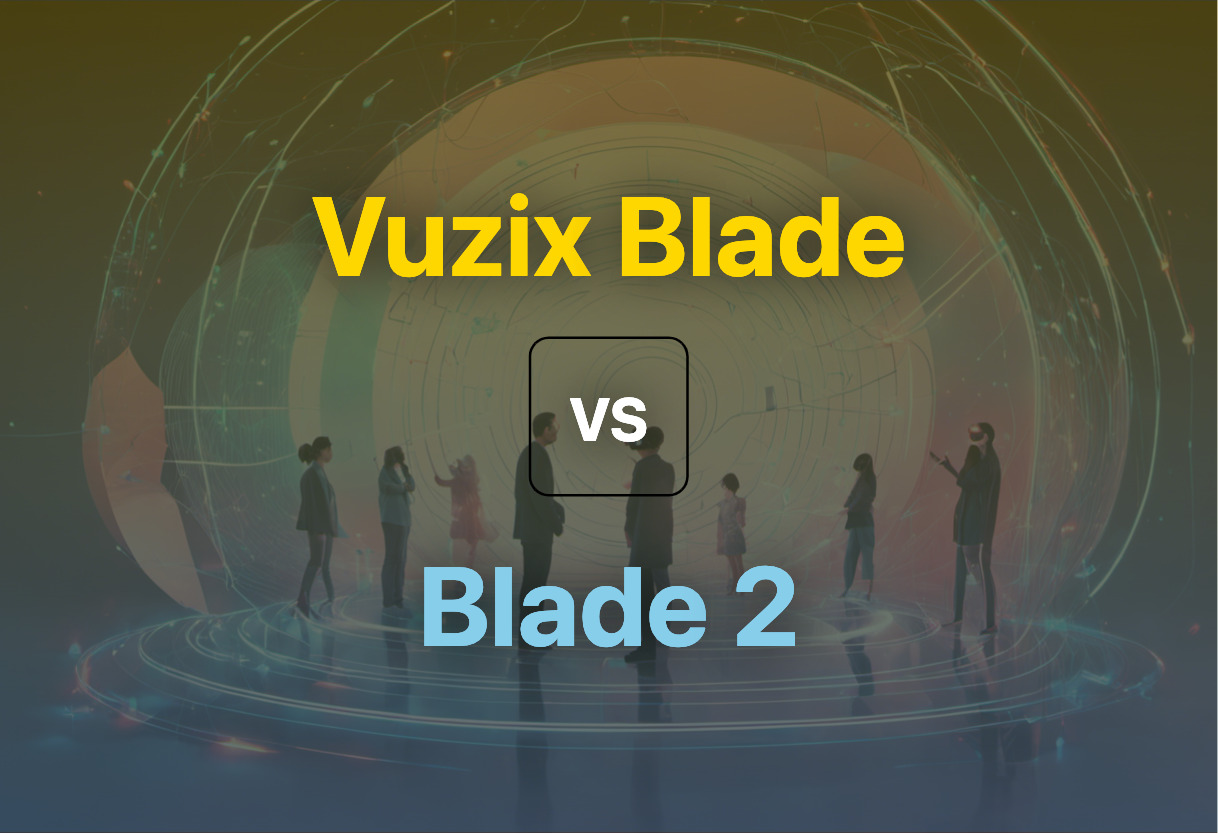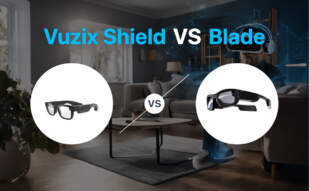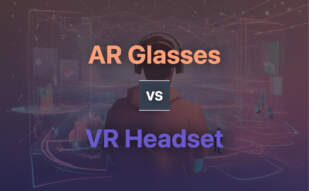For intensive enterprise use, Blade 2 stands out with enhanced features like advanced processor, Android 11 OS, and wider WiFi capabilities, essential for multifarious applications. Despite the higher cost – $1,299.99, Blade 2, owing to its superior interface, is a worthy investment for professionals seeking AR smart glasses.

Key Differences Between Vuzix Blade and Blade 2
- Operating System: Blade runs on Android OS, while Blade 2 operates on the more recent Android 11 OS.
- Processor: Quad Core ARM CPU for Blade, while Blade 2 integrates Qualcomm high-performance processor.
- Memory: Blade comes with 8GB storage, expandable via microSD. Blade 2 offers 40GB internal memory.
- Enterprise Compatibility: Blade 2 supports enterprise-focused software like MS Teams, Zoom, TeamViewer, and integrates with common MDM solutions.
- Connectivity: Both offer 2.4GHz WiFi, but Blade 2 extends support to 5GHz bandwidth.
- Price: Blade consumer version is priced at $999.99 whereas Blade 2 is costlier, listed at $1,299.99.
- Battery: Blade 2 optimizes battery life, addressing the poor battery life issue in Blade.
| Parameter | Vuzix Blade | Vuzix Blade 2 |
|---|---|---|
| AR Technology | Waveguide AR technology | Ultrabright waveguide optics |
| Certifications | ANSI Z87.1, UV protection lenses | ANSI Z87.1, UV protection lenses |
| Display | 480×853 resolution, 24-bit color transparency | 480×853 resolution, 24-bit full-color |
| Operating System | Android | Android 11 |
| Internal Storage | 8GB, expandable via microSD | 40GB |
| Connectivity | 2.4GHz Wi-Fi, Bluetooth | 2.4GHz and 5GHz Wi-Fi connectivity, Bluetooth |
| Applications | Remote support, Teleconferencing | Remote support, Teleconferencing |
| Pros | Bright display, numerous apps, expandable internal storage via microSD, includes camera | Ultrabright display, Android 11, Qualcomm processor integration, increased memory, enhanced security, support for MS Teams, Zoom, TeamViewer |
| Pricing | $999.99 (Consumer version), $1299.99 (Vuzix Blade 2 AR Smart Glasses) | $1,299.99 |
| Use Case Applications | Healthcare, construction, security, retail | Healthcare, construction, security, retail |
What Is Vuzix and Who’s It For?
Vuzix is a top-tier provider of AR/VR tech, epitomized by their self-contained AR smart glasses, Vuzix Blade® and Blade 2. Designed with the latest optics and electronics, these smart glasses aim at enhancing productivity by reducing distraction and error rates, while increasing user comfort and satisfaction.Vuzix is tailored for users in diverse fields, from healthcare and construction to security and retail.

Pros of Vuzix
- Advanced waveguide display
- Lightweight, ergonomic design
- Integration with Google Assistant & Amazon’s Alexa
Cons of Vuzix
- Poor battery life
- Uncomfortable fit and unflattering design
- High price
What Is Blade 2 and Who’s It For?
Blade 2 is the latest smart glasses model by Vuzix Corporation. Engineered to reduce distractions and enhance workforce efficiency, Blade 2 is optimized for extensive enterprise use across applications, including healthcare, construction, security, and retail. With its ergonomic design and comprehensive safety measures, Blade 2 is perfect for professionals needing to manage various tasks efficiently.

Pros of Blade 2
- Ultrabright waveguide optics
- Enterprise-focused software integration
- Expanded WiFi and Bluetooth support
Cons of Blade 2
- High price
- Needs improved comfort for long-term use
- Dimming effect due to tinted lenses
Vuzix Blade vs Blade 2: Pricing
The Vuzix Blade is priced at $999.99, while the newer version, Blade 2 is priced higher at $1,299.99.
Vuzix Blade
The first iteration of Vuzix’s AR smart glasses, the Blade, carries a price tag of $999.99. This price includes the expansive feature set such as the waveguide display, 8GB internal storage, and integration with Google Assistant and Amazon’s Alexa, but the user has to suffer drawbacks such as an uncomfortable fit and short battery life.
Blade 2
The Blade 2, Vuzix’s third-generation Blade Model, is listed at $1,299.99 on the company’s website. This elevated price point delivers improved features such as Android 11 OS, Qualcomm processor integration, compatibility with enterprise-focused softwares, and expanded WiFi capabilities, justifying the additional investment.
The Verdict: Vuzix Blade or Blade 2?
Putting an end to the tech deliberation, let’s plunge straight into deciphering the most suitable contender for you in the Vuzix face-off.
AR/VR Developers & Enthusiasts
Blade 2, equipped with the latest Android 11 OS and notable Qualcomm processor integration, offers a technologically superior platform for you to expand your horizons. Compelling features like compatibility with enterprise-focused software, a more intuitive interface, and expanded WiFi capabilities make it the discernable choice for this segment.
Healthcare Professionals
For those in healthcare, the more advanced Blade 2 emerges victorious. Offering a blend of improved overlay of digital instructions, seamless MS Teams, Zoom & TeamViewer integration, and enhanced security provisions, it comes ahead to effortlessly manage your demanding schedules. 
Industrial Domain
From construction to security to retail, the stakes are high for industrial usage. Here, Vuzix Blade strikes with its 480×853 resolution display, full UV protection, and the essential ANSI Z87.1 safety certification. Its teleconferencing prowess adds more weight, ultimately crowning it the choice for industrial users.
On the tech battlefield of Vuzix Blade vs Blade 2, the Blade 2 dominates for developers and healthcare due to its elite Android 11 OS, while the Vuzix Blade triumphs in the industrial segment with its superior safety & teleconferencing features.
Grant Sullivan
Content writer @ Aircada and self proclaimed board game strategist by day, AI developer by night.





